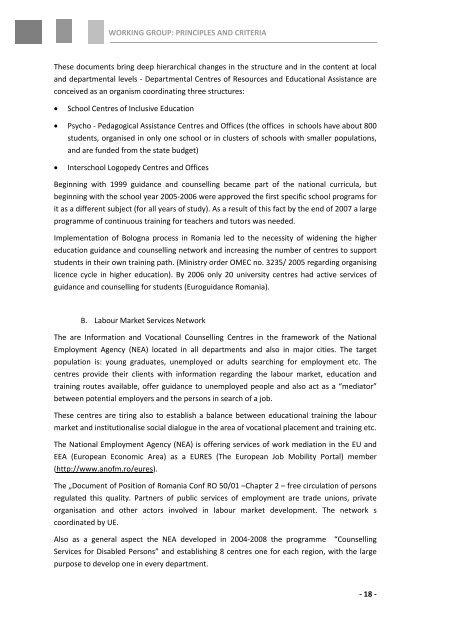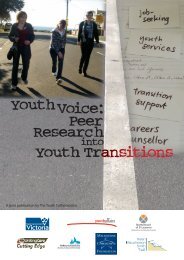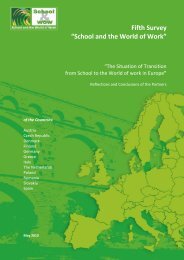Second Survey School and WOW.pdf
Second Survey School and WOW.pdf
Second Survey School and WOW.pdf
Create successful ePaper yourself
Turn your PDF publications into a flip-book with our unique Google optimized e-Paper software.
WORKING GROUP: PRINCIPLES AND CRITERIA<br />
These documents bring deep hierarchical changes in the structure <strong>and</strong> in the content at local<br />
<strong>and</strong> departmental levels ‐ Departmental Centres of Resources <strong>and</strong> Educational Assistance are<br />
conceived as an organism coordinating three structures:<br />
<br />
<strong>School</strong> Centres of Inclusive Education<br />
Psycho ‐ Pedagogical Assistance Centres <strong>and</strong> Offices (the offices in schools have about 800<br />
students, organised in only one school or in clusters of schools with smaller populations,<br />
<strong>and</strong> are funded from the state budget)<br />
<br />
Interschool Logopedy Centres <strong>and</strong> Offices<br />
Beginning with 1999 guidance <strong>and</strong> counselling became part of the national curricula, but<br />
beginning with the school year 2005‐2006 were approved the first specific school programs for<br />
it as a different subject (for all years of study). As a result of this fact by the end of 2007 a large<br />
programme of continuous training for teachers <strong>and</strong> tutors was needed.<br />
Implementation of Bologna process in Romania led to the necessity of widening the higher<br />
education guidance <strong>and</strong> counselling network <strong>and</strong> increasing the number of centres to support<br />
students in their own training path. (Ministry order OMEC no. 3235/ 2005 regarding organising<br />
licence cycle in higher education). By 2006 only 20 university centres had active services of<br />
guidance <strong>and</strong> counselling for students (Euroguidance Romania).<br />
B. Labour Market Services Network<br />
The are Information <strong>and</strong> Vocational Counselling Centres in the framework of the National<br />
Employment Agency (NEA) located in all departments <strong>and</strong> also in major cities. The target<br />
population is: young graduates, unemployed or adults searching for employment etc. The<br />
centres provide their clients with information regarding the labour market, education <strong>and</strong><br />
training routes available, offer guidance to unemployed people <strong>and</strong> also act as a “mediator”<br />
between potential employers <strong>and</strong> the persons in search of a job.<br />
These centres are tiring also to establish a balance between educational training the labour<br />
market <strong>and</strong> institutionalise social dialogue in the area of vocational placement <strong>and</strong> training etc.<br />
The National Employment Agency (NEA) is offering services of work mediation in the EU <strong>and</strong><br />
EEA (European Economic Area) as a EURES (The European Job Mobility Portal) member<br />
(http://www.anofm.ro/eures).<br />
The „Document of Position of Romania Conf RO 50/01 –Chapter 2 – free circulation of persons<br />
regulated this quality. Partners of public services of employment are trade unions, private<br />
organisation <strong>and</strong> other actors involved in labour market development. The network s<br />
coordinated by UE.<br />
Also as a general aspect the NEA developed in 2004‐2008 the programme “Counselling<br />
Services for Disabled Persons” <strong>and</strong> establishing 8 centres one for each region, with the large<br />
purpose to develop one in every department.<br />
‐ 18 ‐




